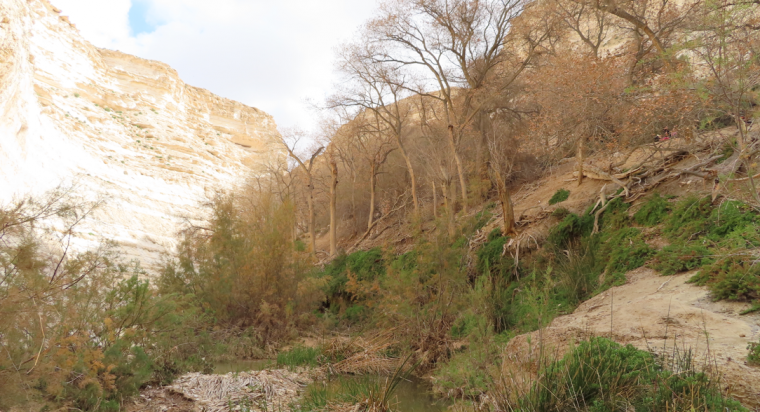
My attention was grabbed from the outset, as it normally is, by the excellent David Attenborough series, “The Green Planet”. The film crew was in the Taklamakan desert in northern China. The camera panned across shifting sands and barren dunes to what appeared to be a solitary tree. The tree was a Euphrates Poplar and it seemed to defy logic by growing in such an arid location. In scripture we associate this tree as growing by water. “By the rivers of Babylon we sat and wept when we remembered Zion. There on the poplars we hung our harps”.
I only came upon this tree once in the Holy Land. It was deep in the Negev desert close to water in the oasis of Ein Avdat. Our guide, Michael Even Esh, explained that it is not native to Israel, and was thought to have been brought to this spectacular gorge in Byzantine times by monks in the fifth century. The monastery was attacked and the community slaughtered during the Persian invasion of 614AD but the tree continued to grow and is now a forest. Michael told us that all the trees are probably one interconnected entity.
Amazing as this seemed, his theory is confirmed by David Attenborough. Temperatures swing from -20 to +40 degrees centigrade in an area almost entirely without rain, yet as the camera zoomed out, that Euphrates Poplar tree in the Taklamakan desert was not alone. He said “Some of these trees have lived here for a thousand years. They have exceptionally long roots with which to collect water. And what is more, those roots are connected to neighbouring trees, so that if one strikes water – others can share it.”
The remnant in exile found a similar resilience in hostile Babylon. They turned again to ancient scriptures, repented of idolatry, heeded their prophets and rediscovered hope. Biblical scholars tell us that it was in exile that the canon of scripture began to take shape. Strengthened by God, they would return to the Promised Land where a shoot would come from the stump of Jesse.
Perhaps the best application that we can learn from the Euphrates Poplar is verbalised by the Apostle Paul when he wrote to stressed believers deep in the interior of hostile Asia Minor, “Carry each other’s burdens, for in this way you will fulfil the law of Christ”.
